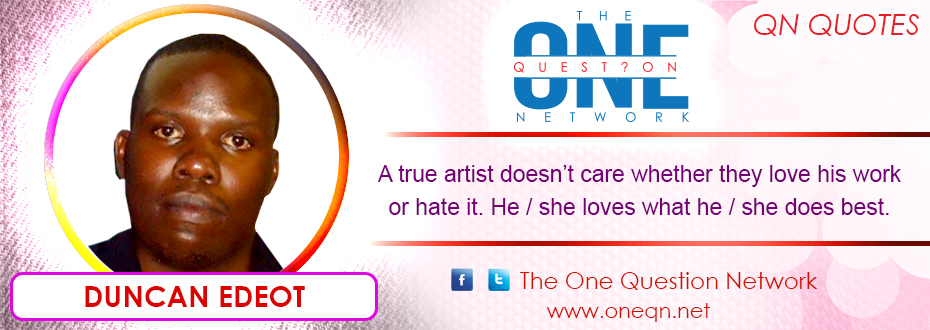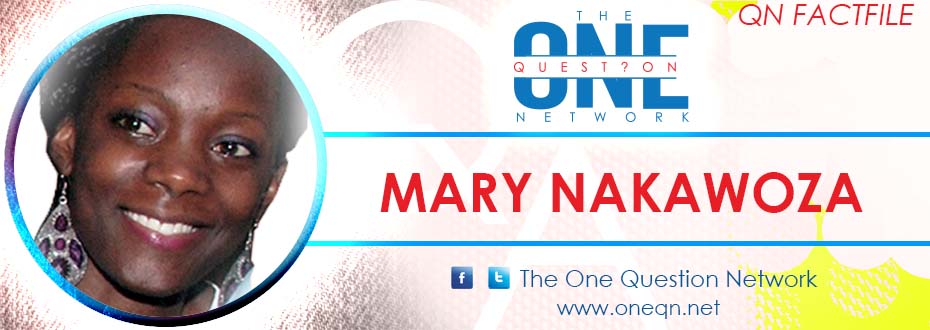Charles Musisi-Five Plus Interview
Joseph Owino – Q-Moja
Aug 6, 2013Thomas Rapa Ricky – Qn-Quotes
Aug 14, 2013Charles Musisi is a graduate of Electrical Engineering, and now Managing Director and owner of the Ugandan IT firm Infinity Computers & Communications Company LTD (i3C), part of the Infinity Management Group which previously traded under the as Computer Frontiers International LTD (CFI) Charles Musisi pioneered the use of Electronic Networks Services in a number of African Countries dating back to the early 1990s, and went on to setup some of the very early Internet Services in the East Africa Sub-Region. Charles Musisi has provided Technology leadership for over 15 years now and has in the process created a successful business which among several services provides Domain Name, Web Design, Mobile & Internet Apps & Hosting Solutions; LAN, Internet & GSM Network Infrastructure Setup & Maintenance; Voice over IP (VoIP) Telephony and Call Center Solutions, and several other Internet Value-Add Services. Charles Musisi setup and manages the UG Country Code Top Level Domain (ccTLD) for Uganda, a role he had since its creation in 1995. Charles Musisi has recruited and trained over 100 Top IT & Telecom professionals now successful in their own right, and many of these have gone on to become owners of thriving businesses while many others are employed in senior roles in the Telecom Sector, the Banking Sector and the other Sectors as well. Elsewhere in an illustrious career, Charles Musisi has been Project leader, or has had a major role in the design of Services and Solutions on IT projects for several Development initiatives funded by many of the leading agencies who include the United States Agency for International Development (USAID), The International Development Research Council (IDRC); United Nations Development Programme (UNDP), the United Nations Environment Programme (UNEP), East Africa Community (EAC), the Common Market for East & Central Africa (COMESA) and The World Bank among many others. Charles Musisi, from the very early days was been at the forefront of the formation of a number of Internet bodies that include the African Registry for Numbers (AfriNIC), the International Corporation for Assigned Names & Numbers (ICANN) and the African Internet Group (AfNOG), and he has been on the governing board of all these and a few others not mentioned here.
Who is Charles Musisi?
I would describe myself from the work I have done for the last twenty years. I would say I’m a technology leader, and a pioneer of a number of IT services. My formal training was in Electrical Engineering, but early on in my career I switched over to IT.
Was it hard starting out in the IT sector, since Uganda is considered to in its infancy in IT?
I can’t say so, as demonstrated by yourself and the work you have done so far in your short career. By and large, IT does not require a lot of capital. It requires mostly brains, creativity, foresight and some dodged determination to succeed.
There was a downsizing of the ICT budget for Uganda, while Kenya and other countries around the region appear to invested more as judged from the recently announced national budgets. What impact will this have on the economy in the immediate short term for Uganda?
That’s true, and infect this struck of us in the IT sector by surprise. This comes against the backdrop recent pronouncements by government IT was a key pillar in its vision for job creation for the future. This as you have correctly observed was against the run off play so to say in the region, and but more importantly in contradiction to government policy of promotion of science in schools. This without a doubt is reverse in the short term if not corrected. This will affect our competitiveness as it will impact on innovation and uptake of new technologies in the work place, and also in industry as government is the biggest spender and hence the catalyst for growth of any sector in the economy. So, reduction in the IT budget means lesser of IT goods and services, and that means its impacts on the private sector revenues, and in the long term on innovation in this particular sector. That means, we’ll at a later stage start playing catch-up to the other countries which will be costly.
There’s been global growth in the IT sector in terms of mobile apps, app development. Is Uganda ready to favorably compete on the international scene?
You could say that there is some readiness as seen from some innovations especially with SMS applications. This is a good start, and it also shows that there is a market and also the creative manpower to come up with locally designed apps for local situations. We have seen this in the service sector especially with the likes of national Water & Sewerage Corporation, UMEME and the Banks. This though is still basic stuff. Yes, there some cutting edge innovations that are not well publicized that have come out of Uganda, but these are very few at this point to create any buzz yet on the world stage let alone in the sub-region. What’s apparent is that there is a good level of zeal for creative ideas, and that some very young talent is starting to take advantages of the collaborative nature of the Internet to create and try out opportunities on the global market.
Uganda has a high growth of entrepreneurship. So many businesses start up but very few reach their birth date. What do you think are the problems being faced? And what might be the likely solutions?
This isn’t isolated to IT companies. IT companies play by the same rules, just like any other business. You’ve got to exercise prudence; you’ve got to exercise the same discipline that you would in any business. Its true many startups never see it through to their first birthday. That said, I would say that at this present time IT businesses have a great opportunity to overcome that stigma and stay on to grow.
There’s a notion that entrepreneurs are born, not bred. What’s your take on that?
I can’t see that in my background. Perhaps a little bit of it from my own mother. For most part, my upbringing was modeled around the norm; go to school, try to get good grades and then proceed to get a good job. The entrepreneurial calling is largely a personal decision. There is an entrepreneur in each one of us, so I don’t fully agree with the notion that they are born. But it is the strong and daring ones go on to unleash the entrepreneurial spirit in each of us.
Do you agree that one of the major causes of stagnation with startups is the mistaken idea of wanting to protect the so called million dollar idea?
That’s true. We all fall in this trap a lot of times as we often come up with an idea that we think is an innovation, and before we even allow the idea to blossom we’re out their suffocating the very idea because of the fearful someone will steal the idea and go on to get rich from it. We need to borrow from the open source community, which is about getting the idea out there and sharing it out, and letting the community out there to add to the idea. A friend of mine once told me that if you get out first off the blocks, there is likely you’ll be the leader and own the victory at the end of the day. The lesson here is to share your idea but keep at the leadership and forefront, and make sure you listen to contributions from others. That’s what open source in the software industry is about. So, my advise is for young innovators not fall in the trap of over protecting unproven ideas. It’s only after you’ve allowed your idea to grow and be tested that you should worry about copyright issues, patent issues and protection of Intellectual Property.
At the moment you manage, or some say you own UG Domain Name. Is it expensive to have the ownership rights?
Let me clarify this, it is not a question of ownership. It is about administering this Domain Name space responsibly for that interested members of the community can have access to it and use for their own good. That’s what we have done for the past several years. Think of it this way, in a country where we have so many broken services, managing the UG for us has been a pretty straight forward issue of performing public good. Yes, we have also invested a lot of the years to make it what it is – a viable business. It is sustainable and we continue growing it. There has been over the years some unfounded critics borne mostly out of individual envy, and truthfully there is nothing we can do about those individuals. Their motives are selfish. Our mission has been one – to manage this resource responsibly, and that’s what we have done all these years.
The most powerful entrepreneurs do not have PhDs and the like. Does education have an effect on entrepreneurship?
True, that’s what I hear and read about a lot often highlighting successful individuals who at the start did not have a chance in life if acquiring very high education was a sure way to success. Let me say this, any day I would prefer to have acquired a good education to being illiterate. Roll back the clock and bestow on me a lot of success and I would tell you it’s a lot better to acquire some good education. There are special attributes you can give to the individuals who have made it with very little education, and one of them is their fearlessness. They are not inhibited by the logic often found in the principals on how to be successful, and the inherent fears of failure. We were told in the old days that the entrepreneur is the risk bearer who wanders into the unknown which to most would seem like a path of doom. I have to say though, there more successful educated people than the uneducated lot. From a starting point of little or no education, succeeding against adversity is usually the exception and not the norm
How do you stand out in this crowded IT sector?
We have our niche that I think we have exploited very well so far in this market. Of course we’re a very innovative group, and every time we have to create new solutions and offers to keep up with the pace of things in this high growth sector. I have to say we’re lucky to be in this industry at this moment as IT is experiencing phenomenal growth. IT is breaking into every aspect of society, and as a result, there are opportunities out there in this sector. I have seen it for the past 20 years. I’m old enough to know this very well. I am a player in this sector, and I intend to go a few more years.




